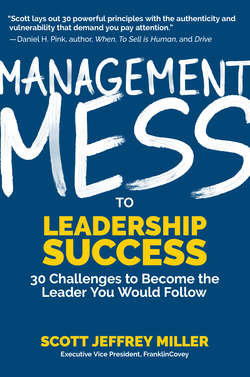Читать книгу Management Mess to Leadership Success - Scott Jeffrey Miller - Страница 14
На сайте Литреса книга снята с продажи.
ОглавлениеYou’ve probably had occasion to dine at a buffet (except for my sophisticated wife, who abhors them). There are two schools of thought when approaching the line: First, there’s only a finite amount of food, so grab everything you want before someone else does. On the other hand, you might believe that there’s plenty of food to go around, more than anyone could possibly finish, so you can let the elderly man with the oxygen tank go ahead. There will be enough shrimp for everyone. Remember, they arrived frozen in a 40-pound bag, after all.
These two warring mindsets illustrate the difference between a Scarcity Mentality (get yours before it’s gone) and an Abundance Mentality (there’s plenty to go around for everyone).
The first memorable lesson as an adult came from a FranklinCovey colleague. I was deciding whether to move from Provo, Utah, to the ski mecca of Park City, about 50 miles away. Same job, just a longer commute from a hip resort town. (Provo and Park City are about as different as skim milk is from tequila.) The relocation would almost double my rent, and I was trying to determine if this would be a good financial decision (to be clear, it wasn’t). As I was talking about this with my leader at the time, he said something I will never forget: “You’ll never have enough until you define how much is enough.” I’ve shared that aphorism with countless friends, because it speaks to the heart of abundance thinking. Define “enough,” or you’ll be constantly worried you don’t have enough and, even worse, risk becoming incapable of providing or sharing with others.
THESE TWO WARRING MINDSETS ILLUSTRATE THE DIFFERENCE BETWEEN A SCARCITY MENTALITY (GET YOURS BEFORE IT'S GONE) AND AN ABUNDANCE MENTALITY (THERE'S PLENTY TO GO AROUND FOR EVERYONE).
My second lesson was a little more brutal and, appropriately enough for our culinary theme, happened over lunch. (I have a proven method for choosing restaurants for business meetings. If I expect the exchange to be high-stakes, I like being in a secluded booth on neutral ground. I never have difficult conversations in my favorite restaurants, so I can distance the emotion of the meeting from my affinity for the food.)
On this occasion, I had scheduled lunch at one of my favorite restaurants, Cracker Barrel, because I was expecting a pleasant meal with one of my most trusted team members, Jimmy. Imagine my surprise when he ordered the country-fried steak and announced, “Scott, I’m tired of you taking credit for all of my projects.”
That sentence needs no translation. Further context? Yes, please.
Jimmy continued by sharing specific instances where he felt I had overshadowed his work: announcing the results of a campaign he’d led via a companywide email that, because it originated from me, implied I alone was responsible for its success; enthusiastically promoting a product launch that appeared to diminish his role and expand my own; and other instances where my formal stature (and authority to send companywide emails) reinforced his mindset about my self-absorbed behavior. In each case (and according to him, there were more), I had never even mentioned his contribution.
My first instinct was to disagree, and to do so with a healthy dose of indignation. The old mess in me certainly would have done that—I used to pride myself on telling people the way things were, damn the consequences. But working at FranklinCovey had changed me, and I inhaled a measured breath between the stimulus of the moment and my chosen response. I did my best to validate Jimmy’s concern and commit to being more aware of the issue.
After lunch, I began to unpack what he’d said. How much of it was true? Certainly, I had no reason to hoard credit. At that point in my career, my influence in the firm was substantial and my track record with the CEO and the board was exceptional. Was I so insecure that I needed more attention and accolades than I already had? Was reaching up for that next rung on the career ladder more important than helping someone else up? Had I really—consciously or subconsciously—managed my brand, reputation, and career at his expense?
I made a conscious effort to publicly praise anyone who truly warranted it, and share credit when my team had shone independent of me. I haven't always been perfect but by remembering the principle of abundance, I believe I've become a more gracious, generous, and respectful leader. And not only do I not miss out, I've found more reward in the accomplishments of others.
I believe the executive team would tell you that, in their presence, I frequently lift others up and acknowledge their contributions. But what happens in a closed-door C-suite meeting rarely gets passed on to other employees. So, what went wrong this time?
I had failed to think abundantly.
It’s human nature to feel scarcity when we fear we won’t have enough—money, gifts, attention, praise, fill in the blank. Was there really a finite amount of credit in the firm? Clearly, no. To use the buffet metaphor, I kept stacking “credit” on my plate like an ever-growing pile of shrimp. Not only had I not stopped to consider “how much was enough,” I was driven by a scarcity mindset that made me fearful of missing out on even more credit. Worst of all, I wasn’t even aware that I thought that way.
After my conversation with Jimmy, I made a conscious effort to publicly praise anyone who truly warranted it, and share credit when my team had shone independent of me. I haven’t always been perfect since then, but by remembering the principle of abundance, I believe I’ve become a more gracious, generous, and respectful leader. And not only do I not miss out, I’ve found more reward in the accomplishments of others.
